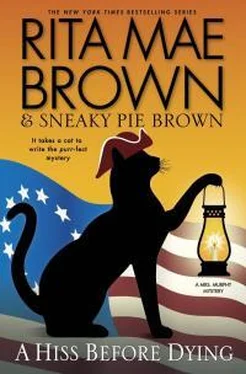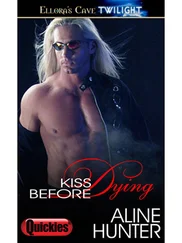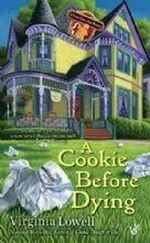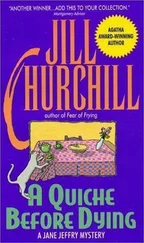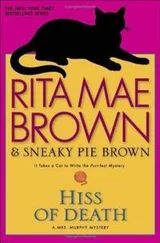Maureen and Jeffrey attended. Well, just about everybody did, but Maureen wanted everyone to see the carriage her husband had built with his father. Indeed, it was a beauty and people marveled that a local cabinetmaker mastered the skills so quickly. Just getting the angle of the big wheels correct on the axle took some doing. Jeffrey was not afraid to ask for help and to import same. The coach-in-four gleamed a deep maroon with gold pinstriping. On the doors, Maureen’s crest had been painted. Yes, it was not the thing to do in a new republic, but Maureen’s defense was that she was from the Caribbean. No one argued. Of course, there were those who thought she should return to the Caribbean.
The Shippenworths from Philadelphia were also there, having stayed in Virginia for the better part of the year. Their carriage, splendid but not flashy, would carry the Holloways and themselves to Hot Springs. If General Washington and Thomas Jefferson could take the waters there, so could the Shippenworths and the Holloways. The springs remained warm regardless of the season. Many swore by their medicinal powers.
The service, dignified, closed with “Ashes to ashes, dust to dust.” Tears filled many eyes.
Rachel, wiping her own, said in a low voice, “They left us too soon, but they left us with a good example.”
Charles, arm around her waist, nodded. “A short good life is better than a long, useless one.”
As the assembled walked toward the log building, the main church was not yet ready for people, the delicious scent of food filled the air.
Inside, Bettina, Serena, even Bumbee, busied themselves. Ewing had asked them to honor the Taylors. He paid them, too, for intruding on their Sundays. The women and the other slaves working in the makeshift kitchen liked the Taylors. Bettina, having lost her own husband at a young age, thought death made all people equal, king as well as slave. It was not an equality she soon wished to experience.
St. Luke’s parishioners, the white women, also worked in the kitchen. Cooking, serving food did seem to bind women.
“Miss Ix, this bacon is perfect,” Bettina praised the German immigrant.
Given Bettina’s reputation, Miss Ix smiled. “I do try, Bettina.”
Sheba did not serve, but she did her mistress’s bidding, as did Henry. DoRe popped into the kitchen, winked at Bettina, then popped out. How the ladies laughed even if it was a funeral.
“That man.” Bettina pretended this was uncalled-for.
“Oh, Bettina, what would we do without their foolishness?” Lillian Bosum remarked.
“We’d get more done.” Rebecca Smythers arranged sweetbreads on a tray.
Jutta Rogan nodded, then added, “Surely we would, Becky, but would we have as much fun?”
As they chattered, the front door opened, the people poured in. The hum of talk filled the room.
Given the distances, the constant labor, even a funeral provided warmth, gossip, the sense of belonging.
Ewing, legs tired from standing, sat on one of the graceful, simple backed benches.
“Father, what can I fetch you?” Rachel asked.
“Anything at all, my dear, but a pinch of punch would certainly restore my spirits.”
“Right away.” Charles, next to his wife, headed for the enormous silver punch bowl, loaned to the church for this occasion by Maureen.
Catherine, next to Maureen at the long food table, noted this. “Mrs. Holloway, what a kindness. If only the Taylors could see your contribution to their memory.”
A solemn look flashed across Maureen’s face. “Catherine, my dear, I believe they can. Nothing is ever truly lost except my husband’s temper.”
Catherine did laugh. “In a good cause.”
“I am still shaking from that experience, but isn’t it strange how men can try to kill one another, then make up?” She indicated with her head her husband talking to Yancy Grant.
Yancy, on his crutch now, also sat down, Jeffrey on one side of him with John on the other. John did not anticipate trouble but he felt either gentleman could be combustible.
“Mr. Grant.” Jeffrey leaned toward the older man. “Your interest in finance, well, let me put it this way, Mr. Shippenworth has a broad vision for our country’s finances.”
“Does he now?”
“I suspect he knows Sam Udall,” Jeffrey replied.
Yancy considered this. “Mr. Udall has a sure grasp of value whether it be tobacco or land or hemp. He knows the day’s prices. I wouldn’t be surprised if the two have met.”
John leaned toward Yancy slightly. “He and Ewing see each other frequently.”
“If anyone knows money, it’s Ewing.” Yancy complimented the well-liked man.
The discussion between Ewing and Mr. Shippenworth was so lively other men gravitated toward them to listen.
“I tell you, Mr. Garth, we need a national bank to stabilize our monetary policy. It’s not taxes that matter, Sir, it is monetary policy and we have none.”
Men leaned closer.
Ewing, careful, replied, “You, Sir, are far better informed than I. I do not argue the point at all but I fear a national bank will offend our people. It’s too close to the Exchequer in England.”
A murmur of agreement attended this.
“We must go beyond the war years. There are things the English do that make great good sense,” Shippenworth countered.
Big Billy Bosum, the parishioner passionate about building a navy, spoke. “The Europeans think of control. If they can control us through money, so be it. Controlling us by arms failed, but I do not think we can ever rest easy until we have a standing army, a large navy, and men committed to defending our shores and, I add, our businesses.”
“Hear, hear,” many said.
Catherine, plate filled for old Mrs. Ciampi, partially blind, circumvented the lively discussion.
“Mrs. Ciampi, what would you like to drink?”
“Oh, thank you, dear. Have they any sweet tea?”
“Always. I’ll be right back.” Catherine hurried to the drinks table, met Rachel there, and both sisters returned to the elderly lady.
“Thank you. It’s a bit warm for mid-October. I find I am thirsty.”
Rachel spoke. “Beautiful day, though.”
“Oh, you two girls sit with me for a moment. I miss young people.” Her little mobcap shook a bit as she spoke, for her head wobbled. “The loss of the Taylors distresses me. Such good people and in the prime of life. Oh, Margaret fussed about getting old and I would chide her, ‘Old. Look at me! I was born in 1712. Don’t talk to me about old.’ ”
They both laughed.
Rachel then said, “Mrs. Ciampi, you have more energy than women half your age.”
This pleased the lady no end. “I will tell you my secret.” She motioned for them to come a bit closer. “Never stop. Truly, never stop. Keep cleaning, cooking, chopping your own wood. Go on walks with the dog. Dig in your garden. We are meant to be busy. Idle hands do the Devil’s work.”
When the funeral gathering broke up all agreed that the number of people, the quality of the food, Mrs. Holloway’s huge punch bowl, proved how valued were the departed.
Maureen and Jeffrey climbed into the Shippenworths’ coach. Everyone went their separate ways. DoRe, now high in the driver’s seat, waited for Sheba and Henry to get inside the coach.
Henry said not one word to Sheba nor she to him on the way to Big Rawly.
—
That evening, Sheba tiptoed into Maureen’s bedroom. She knew where everything was. She put on Maureen’s exquisite mustard-colored silk dress, the one with a low-cut bodice. Then she opened her jewelry box, for she knew where the key was. Picking up one glittering piece after another, she decided the colored stones would clash with the mustard color. Sheba possessed a good eye. Walking to the corner, she knelt down, then lifted up a loose floorboard. She took out the pearl necklace, the one with the huge pearl in the center, placed it around her own neck. Then she put the dangling large pearl earrings in her ears, the very pearls she had accused Mignon of stealing. Sheba longed for the day when she could wear what she had hidden.
Читать дальше
